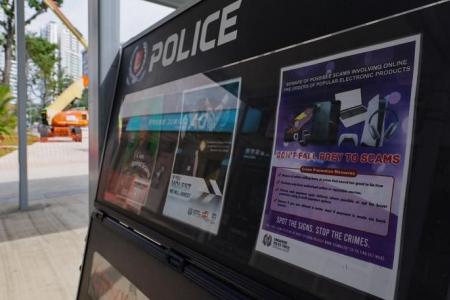Tougher laws proposed to curb criminal misuse of SIM cards
Tougher laws aimed at targeting those who enable the misuse of SIM cards have been proposed after such cases quadrupled in just two years.
The Law Enforcement and Other Matters Bill was read for the first time in Parliament on March 7, and proposes allowing the police to take stronger action against those who enable the misuse of local SIM cards for criminal activity.
The number of local mobile lines involved in scams and other cybercrimes jumped from 5,867 in 2021 to 23,519 in 2023.
The amount lost in such cases almost tripled, from $137 million in 2021 to $384 million in 2023.
The Ministry of Home Affairs (MHA) said the police face difficulties in prosecuting those who give away their SIM cards or provide their particulars to others to be used to sign up for SIM cards.
Such persons, who have been dubbed “irresponsible registrants” by MHA, typically claim ignorance.
In doing so, the authorities are unable to prosecute them, as current laws require the police to prove that these irresponsible registrants had knowingly given away their SIM cards for unlawful purposes, or knew that their SIM cards would be used for criminal activity.
MHA added that scammers have been using local mobile lines to receive scam monies via PayNow, and have used such lines to set up messaging accounts on platforms like WhatsApp to perpetuate scams.
Scam victims lost $651.8 million in 2023, with a record high of over 46,000 cases reported.
Local mobile lines have also been used in other crimes, with 1,329 such lines used in unlicensed moneylending in 2023.
The Bill proposes offences targeting three groups of offenders, including irresponsible registrants and errant retailers.
To deal with irresponsible registrants, it is proposed that it will be an offence for a person to hand over local SIM cards registered in his own name, or to allow his own particulars to be used to sign up for a local SIM card by another person, if he believed the SIM card would be misused.
This includes selling or giving away the card for any gain, and giving his particulars to a stranger to sign up for SIM cards.
However, those who have legitimate reasons, such as registering a SIM card for their family members, will not be liable. Those who were genuinely tricked into giving up their particulars would also not be liable.
Another offence proposed is to target those who broker SIM cards for misuse.
It will be an offence for a person to receive, supply or possess local SIM cards which are registered using another persons’ particulars, or those involving unregistered SIM cards, if they have reason to believe the cards would be misused.
A person would be liable if they are found to have 11 or more of such SIM cards, or they have a SIM card that was previously used for crime.
For this offence, a person would again not be liable if they have legitimate reasons, such as being an employer who was holding on to SIM cards intended for employees.
The third proposed offence is to target retailers who facilitate fraudulent registration of local SIM cards.
It is proposed that it be an offence for a mobile service provider or retailer to register a local SIM card using any person’s particulars without that person’s authorisation, or knowing that the particulars were false or misleading, if they believe the cards would be misused or the cards were later used in a crime.
In January 2024, an authorised dealer in mobile phones was fined a record $48,000 for exploiting customers’ personal data to register SIM cards without their knowledge or consent, before selling them.
The offence targeting irresponsible registrants will carry a fine of up to $10,000 and a jail term of up to three years.
The offences targeting the brokers and retailers of SIM cards for misuse will similarly carry a fine of up to $10,000 and a jail term of up to three years for a first offence, but a fine of up to $20,000 and a jail term of up to five years for a subsequent offence.
MHA said the offences will apply to corporations and unincorporated associations such as partnerships and societies.
But as these entities are not able to be subject to imprisonment, the maximum fines for these entities will be doubled.
The Bill also proposes amendments to rectify smaller gaps in the law and unintended coverage.
It is currently a crime to transmit a message which is false or fabricated, but this also covers simulated phishing exercises which companies carry out to bolster their cybersecurity. The amendments rectify this.
Another part of the amendments are to enhance the police’s ability to apprehend persons posing a safety risk to themselves and others, enable the police not to take further action in cases of non-arrestable offences under certain circumstances, and for certain enforcement officers who are not police officers to grant bail.
Get The New Paper on your phone with the free TNP app. Download from the Apple App Store or Google Play Store now


